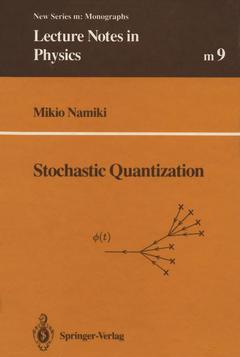Description
Stochastic Quantization, Softcover reprint of the original 1st ed. 1992
Coll. Lecture Notes in Physics Monographs, Vol. 9
Author: Namiki Mikio
Language: French
Keywords
Approximative price 137.14 €
In Print (Delivery period: 15 days).
Add to cart
Publication date: 11-2013
217 p. · 17x24.4 cm · Paperback
217 p. · 17x24.4 cm · Paperback
Description
/li>Contents
/li>
This is a textbook on stochastic quantization which was originally proposed by G. Parisi and Y. S. Wu in 1981 and then developed by many workers. I assume that the reader has finished a standard course in quantum field theory. The Parisi-Wu stochastic quantization method gives quantum mechanics as the thermal-equilibrium limit of a hypothetical stochastic process with respect to some fictitious time other than ordinary time. We can consider this to be a third method of quantization; remarkably different from the conventional theories, i. e, the canonical and path-integral ones. Over the past ten years, we have seen the technical merits of this method in quantizing gauge fields and in performing large numerical simulations, which have never been obtained by the other methods. I believe that the stochastic quantization method has the potential to extend the territory of quantum mechanics and of quantum field theory. However, I should remark that stochastic quantization is still under development through many mathematical improvements and physical applications, and also that the fictitious time of the theory is only a mathematical tool, for which we do not yet know its origin in the physical background. For these reasons, in this book, I attempt to describe its theoretical formulation in detail as well as practical achievements.
Background Ideas.- Elements of the Theory of Stochastic Processes.- General Prescription of Stochastic Quantization.- Perturbative Approach to Scalar Field Theory.- Perturbative Approach to Gauge Fields.- Stochastic Quantization of Constrained Systems.- Superfield Formulation.- Renormalization Scheme in Stochastic Quantization.- New Regularizations in Stochastic Quantization.- Generalized Langevin Equation and Anomaly.- Application to Numerical Simulations.- Minkowski Stochastic Quantization and Complex Langevin Equation.
© 2024 LAVOISIER S.A.S.
These books may interest you

Geometry, Topology and Quantization 105.49 €



